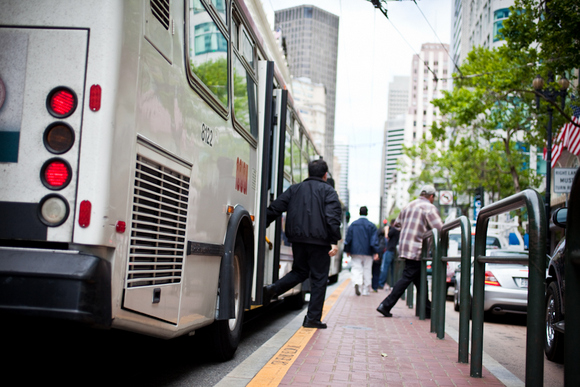House Transportation Bill: What’s at Stake for the Bay Area
2:24 PM PST on February 15, 2012
Reliable transit and safer streets in San Francisco and the Bay Area could be crippled by what U.S. Secretary of Transportation Ray LaHood has called "the worst transportation bill [he's] ever seen" making its way through the U.S. House of Representatives.
As Streetsblog Capitol Hill has been reporting, H.R. 7, the federal transportation bill being pushed by House Republicans, would be disastrous for transit riders and crippling for programs that fund pedestrian and bicycle safety.
In the Bay Area, the damage would be especially severe: "California receives a huge share of the federal funding for public transportation because of our extensive systems, and the House bill could end up zeroing out federal support for transit," said Stuart Cohen, executive director of TransForm, a Bay Area transit advocacy group that lobbies at the state and federal level. Instead, transit "would have to battle in the ever-shrinking general fund."
Transportation for America spokesperson David Goldberg told the San Francisco Examiner today that about $638 million annually could be withheld to Bay Area transit agencies, which "could ultimately lead to service cuts, fare increases and deferred maintenance on vehicles."
Yesterday, Bay Area mayors Ed Lee of San Francisco, Jean Quan of Oakland, and Chuck Reed of San Jose expressed their opposition to the bill in an op-ed in the Examiner, calling on Congress to protect their cities' transportation funding:
While roads and bridges are a critical component of California’s infrastructure, diverting vital funding for sustainable modes of travel is unwise. If this wrongheaded approach moves forward in the House, the nation’s transportation network will take a giant step backward to a “roads only” policy for dedicated funding...
Cities throughout California are dependent on a robust multimodal, accessible transportation system. Maintaining mobility in our communities is fundamental to our overall economic vitality, getting people to their workplaces, daily appointments and to downtowns for shopping.
We’ve seen that cities, particularly those in California, continue to drive our nation’s economic resurgence. To choke off our most important resource for transportation infrastructure would be devastating to our recovery. We mustn’t stay silent as the House considers this legislation.
"At a time when Muni needs over $7 billion just to mantain a state of good repair over the next generation, it could see devastating cuts -- hundreds of millions over the next five years -- to funding that now goes to maintain their system," said Cohen.
"Improving mobility in our transit-first city is fundamental to improving our Muni system, our bike networks, pedestrian access and safety, taxi service, and car and ridesharing resources," said SFMTA Director of Transportation Ed Reiskin. "Both regionally and nationally, cities have depended on a strong multi-modal, accessible transportation system to further our economic resurgence. If members of the House turned their back on us now, it would slow any progress indefinitely."
Cohen said the bill could also undermine the region's "ability to provide great innovative models and pilot projects that can lead us to a new, more sustainable transportation system."
"Some of the Bay Area's most innovative programs are currently funded by federal sources," said Cohen, including the Metropolitan Transportation Commission's Transportation Climate Action Campaign, which will fund projects like regional bike share.
Improvements for safer bicycling and walking would also lose all dedicated federal funding under the bill, which has been expressly opposed by the San Francisco Bicycle Coalition and Walk San Francisco. SFBC Deputy Director Kit Hodge told the Examiner that the organization is "appalled" by the proposal.
Cohen said programs like Safe Routes to Schools could still hunt for funding from local sources, "but we've been depending on federal funds for many infrastructure improvements near schools."
H.R. 7 was recently split into three separate bills, and the latest reports indicate the House may not vote on the transportation component until after the President's Day recess -- a sign of weakness but far from a guarantee that the bill will fail. Advocates are calling on opponents to urge their congressional representatives to defend bicycle, pedestrian, and transit funding in favor of a better bill.
"Even though the House bill is not likely to pass as currently proposed, we fear that this is really the House Republicans drawing a new marker in the sand," said Cohen. "As the Highway Trust Fund and the general fund continue to deteriorate, some of these proposals that now seem far-fetched could receive real consideration. We must take these threats seriously and have everyone join Transportation for America's coordinated campaign for a bill that promotes efficiency, equity and sustainable jobs."
Stay in touch
Sign up for our free newsletter




